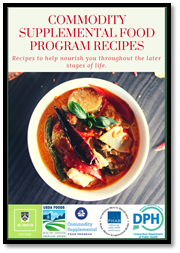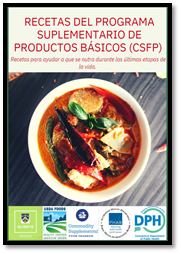
Supplemental Nutrition Assistance Program - Education (SNAP-Ed)
To schedule Nutrition Education for your SNAP-eligible clients, click here or visit SNAP4CT to access calendar events and resources. For information and resources on eating health and being active, please visit the Action Pack web page.
For results on the evaluation of the 2019 Action Pack Media Campaign, please click on the report here.
Commodity Supplemental Food Program
The Commodity Supplemental Food Program (CSFP) works to improve the health of low-income persons at least 60 years of age by supplementing their diets with nutritious food products provided by the U.S. Department of Agriculture (USDA). For information about CSFP, please visit: Commodity Supplemental Food Program | Food and Nutrition Service (usda.gov)For recipes and videos using CSFP ingredients, click on the below virtual cookbook. In addition to recipes, the cookbook provides food safety and healthy eating tips, along with helpful nutrition facts.
MyPlate for My Family

MyPlate for My Family (MPFMF) is a SNAP nutrition education curriculum designed for parents and caregivers who are SNAP-eligible. The curriculum has four lessons promoting physical activity and healthy food choices within a budget.
To learn how to establish healthy eating habits and have an active lifestyle in a fun and interactive way, click on each of the four lessons below to participate in the MPFMF eLearning curriculum. Lessons are: self-paced, offer cooking demonstrations, practice games, physical activity ideas, healthy recipes, tips, and much more!
English
- MyPlate Family Meals
- Watch your Fats, Sugars, and Sodium
- Vegetables and Fruits - Simple Solutions
- Family Time Active and Fun!
Spanish
- Comidas Familiares MyPlate
- Vigila tus Grasas, Azúcares y Sodio
- Verduras y Frutas - Soluciones Sencillas
- ¡Tiempo en Familia Activo y Divertido!
The Supplemental Nutrition Assistance Program (SNAP), formerly known as food stamps, is a federal program that offers nutrition assistance to low-income individuals and families. SNAP is the largest program in the domestic hunger safety net. SNAP provides families with their basic nutritional needs to get them through temporary hardship.
 For more information about the SNAP program in Connecticut, please visit the Department of Social Services website.
For more information about the SNAP program in Connecticut, please visit the Department of Social Services website.
USDA Nondiscrimination Statement
In accordance with federal civil rights law and U.S. Department of Agriculture (USDA) civil rights regulations and policies, this institution is prohibited from discriminating on the basis of race, color, national origin, sex (including gender identity and sexual orientation), religious creed, disability, age, political beliefs, or reprisal or retaliation for prior civil rights activity.
Program information may be made available in languages other than English. Persons with disabilities who require alternative means of communication to obtain program information (e.g., Braille, large print, audiotape, American Sign Language), should contact the Agency (state or local) where they applied for benefits. Individuals who are deaf, hard of hearing or have speech disabilities may contact USDA through the Federal Relay Service at (800) 877-8339.
To file a program discrimination complaint, a Complainant should complete a Form AD-3027, USDA Program Discrimination Complaint Form which can be obtained online at: https://www.usda.gov/sites/default/files/documents/ad-3027.pdf, from any USDA office, by calling (833) 620-1071, or by writing a letter addressed to USDA. The letter must contain the complainant’s name, address, telephone number, and a written description of the alleged discriminatory action in sufficient detail to inform the Assistant Secretary for Civil Rights (ASCR) about the nature and date of an alleged civil rights violation. The completed AD-3027 form or letter must be submitted to:
(1) mail: Food and Nutrition Service, USDA
1320 Braddock Place, Room 334
Alexandria, VA 22314; or
(2) fax: (833) 256-1665 or (202) 690-7442; or
(3) email: FNSCIVILRIGHTSCOMPLAINTS@usda.gov
This institution is an equal opportunity provider.



